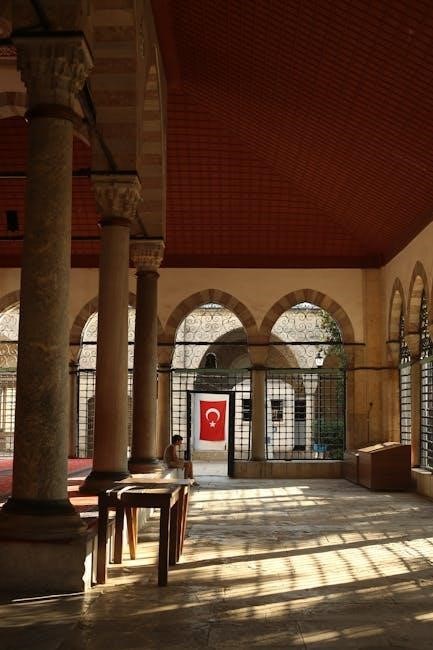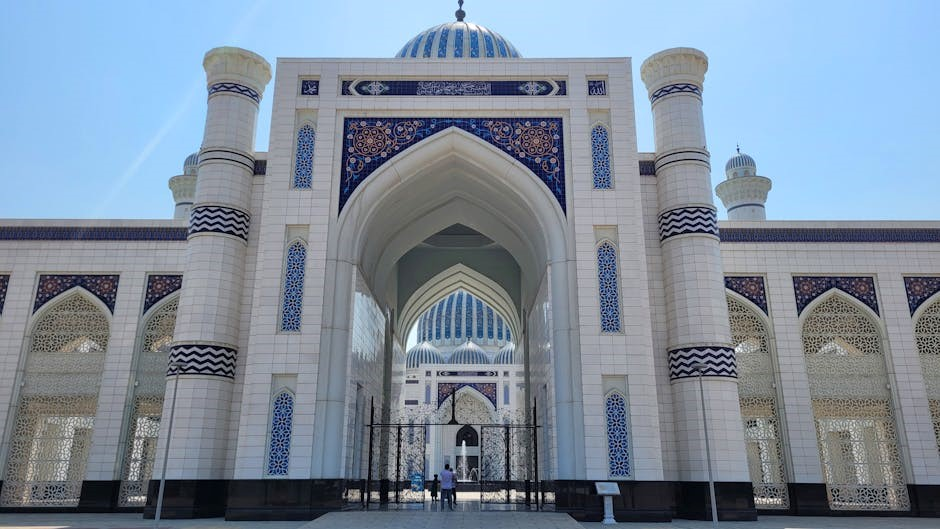Islam’s truth lies in its divine revelation, the Quran, which guides humanity morally and spiritually․ Its teachings, vivid prophecies, and transformative power offer compelling evidence of its authenticity and timeless relevance․

The Quran: A Divine Revelation
The Quran is revered as a divine revelation, preserved in its original form, offering profound linguistic and spiritual truths․ Its scientific accuracy and timeless wisdom affirm its miraculous nature․
1․1 Preservation and Authenticity of the Quran
The Quran’s preservation is unparalleled, with its text remaining unchanged since revelation․ It is meticulously memorized and written, ensuring its authenticity․ Annual reviews during Ramadan and strict memorization practices by millions of Huffaz (memorizers) guarantee its integrity․ The Quran’s linguistic and historical consistency across centuries and translations further validates its divine origin․ This steadfast preservation underscores its reliability as a source of eternal truth and guidance․
References: SA Caraballo and L Michalak highlight the Quran’s enduring authenticity and its role as a cornerstone of Islamic faith, emphasizing its unaltered state as a miracle in itself․
1․2 The Quran’s Linguistic and Literary Miracle
The Quran is renowned for its extraordinary linguistic and literary excellence, considered a divine miracle (I’jaz)․ Its unique style, rhythm, and eloquence defy human replication, blending prose and poetry seamlessly․ Scholars and literary critics marvel at its precision and depth, with verses that inspire profound reflection and emotional resonance․ The Quran’s language transcends time, maintaining relevance and impact across centuries․ Its inimitable style is seen as evidence of its divine origin, challenging humanity to produce something comparable․ This linguistic and literary uniqueness has been a cornerstone of Islamic belief, affirming the Quran’s status as a revelation from God․

1․3 Scientific Miracles in the Quran
The Quran contains numerous scientific descriptions that align with modern discoveries, considered miracles (I’jaz) by Muslims․ It describes embryonic development, stating life begins as a drop of semen, then clings as a clinging clot, and develops into flesh (Quran 39:6, 23:12-14)․ These stages mirror contemporary embryology; The Quran also details cosmic phenomena, such as the expansion of the universe (51:47) and the orbits of celestial bodies (36:40), centuries before scientific confirmation․ Geological concepts like the formation of mountains (31:10) and the water cycle (36:34) are also accurately described․ These scientific references, unknown in the 7th century, are seen as evidence of the Quran’s divine origin, challenging human explanation and affirming its truthfulness․

The Life and Teachings of Prophet Muhammad (Peace Be Upon Him)
Prophet Muhammad (PBUH) exemplified moral excellence, compassion, and just leadership․ His teachings on morality, justice, and mercy transformed societies, offering a divine blueprint for human conduct and spiritual growth․
2․1 The Prophet’s Character and Morality
Prophet Muhammad (PBUH) was renowned for his exceptional character and morality․ His compassion, forgiveness, and fairness inspired those around him․ He consistently demonstrated humility, even in times of triumph, and remained steadfast in his principles․ His moral teachings, such as honesty, justice, and kindness, continue to guide millions․ Historical accounts highlight his gentle nature, especially in dealing with adversaries, showcasing a profound sense of empathy․ His life serves as a timeless model of ethical behavior, reflecting the divine wisdom imparted through him․ Through his actions and words, he exemplified the highest standards of human conduct, leaving a legacy of moral excellence that remains unparalleled․ His character stands as a testament to the truth of Islam, offering a universal blueprint for righteousness and compassion․
2․2 Historical Accuracy of His Life and Mission
The life and mission of Prophet Muhammad (PBUH) are well-documented in historical records, including the Quran, Hadith, and Seerah (biographies)․ His teachings and actions were meticulously recorded by his companions, ensuring authenticity․ Archaeological findings and historical accounts from non-Muslim sources also validate key events of his life, such as the Hijra and major battles․ The accuracy of these records is further supported by their consistency and the fact that they have been preserved intact for centuries․ Modern scholarly research continues to verify the historical context of his mission, reinforcing the credibility of Islamic traditions․ This historical precision underscores the divine nature of his message and the truth of Islam․ The alignment of historical facts with Islamic texts provides compelling evidence for the authenticity of his prophethood and the divine origin of his teachings․
Islamic Teachings and Practices
Islamic teachings emphasize the Five Pillars of Islam, fostering a balanced life of faith, worship, and moral integrity․ Practices like prayer and charity cultivate compassion, justice, and self-discipline․
3․1 The Five Pillars of Islam
The Five Pillars of Islam form the foundation of a Muslim’s faith and practice․ The first pillar, Shahada, declares the oneness of God and the prophethood of Muhammad (Peace Be Upon Him)․ The second, Salat, involves five daily prayers that cultivate mindfulness and connection with the divine․ Zakat, the third pillar, mandates charity to the needy, fostering compassion and social equity․ The fourth, Sawm, is fasting during Ramadan, which promotes self-control and empathy for those less fortunate․ Finally, Hajj, the pilgrimage to Mecca, unites believers worldwide in a shared spiritual journey․ These pillars collectively guide Muslims toward a balanced and righteous life, embodying the essence of Islam’s teachings․

3․2 The Concept of Justice and Fairness in Islam
Islam emphasizes justice and fairness as fundamental principles, rooted in the belief that all humans are equal before God․ The Quran stresses equitable treatment in all dealings, advising believers to stand firm for justice, even if it goes against their own interests․ Islamic law ensures fair legal processes, requiring evidence and testimony to uphold rights․ Social justice is promoted through acts of charity and support for the vulnerable․ Leaders are expected to govern with fairness and accountability, reflecting God’s attribute of justice․ These principles guide personal and societal conduct, fostering a balanced and ethical life․ Islam’s commitment to justice and fairness is a cornerstone of its teachings, inspiring believers to create a just and harmonious society․ This emphasis on equality and righteousness underscores Islam’s relevance and truth in guiding humanity toward moral and ethical excellence․
3․3 The Importance of Compassion and Mercy
Compassion and mercy are central to Islam’s teachings, reflecting God’s attributes and guiding human behavior․ The Quran emphasizes mercy as a divine quality, urging believers to show kindness to all creation․ Prophet Muhammad (Peace Be Upon Him) exemplified mercy, teaching that it brings divine favor․ Islamic practices, such as charity and caring for the needy, embody these values․ Compassion extends beyond charity to everyday interactions, fostering harmony and understanding․ Mercy in justice ensures fairness and leniency, while compassion towards family and community strengthens social bonds․ These principles demonstrate Islam’s balanced approach to life, promoting a society rooted in empathy and kindness․ The emphasis on compassion and mercy highlights Islam’s divine wisdom and its relevance in fostering a caring, equitable world․
Scientific and Historical Accuracy in Islamic Texts
Islamic texts, like the Quran, contain accurate descriptions of natural phenomena and historical events, supported by modern science and research, proving their divine origin and reliability․
4․1 Quranic Descriptions of Natural Phenomena
The Quran provides precise descriptions of natural phenomena, such as the expansion of the universe, the formation of mountains, and the water cycle, which align with modern scientific discoveries․
For instance, the Quran mentions the creation of the heavens and the earth in stages, a concept supported by Big Bang theory and cosmic evolution․
It also describes embryonic development in humans, detailing stages like the zygote and fetus, which mirror contemporary embryology․
Such accurate depictions, centuries ahead of their time, demonstrate the Quran’s divine origin and its role as a source of both spiritual and scientific truth․
4․2 Historical Events Verified by Modern Research
The Quran contains descriptions of historical events that have been validated by modern research and archaeological findings․ For instance, the destruction of the civilizations of ‘Ad and Thamud, as mentioned in the Quran, aligns with archaeological discoveries in regions like Petra and Hijr․ Additionally, the Quran’s account of the Battle of the Trench and the migration of early Muslims to Abyssinia is corroborated by historical records․ These events, once considered mythical, have been confirmed through scientific and scholarly investigations; The precision of these accounts underscores the Quran’s authenticity and reinforces the belief in its divine origin․ Such historical accuracy serves as a testament to the truthfulness of Islam and the reliability of its sacred text․

Moral and Ethical Teachings of Islam
Islam emphasizes justice, fairness, compassion, and mercy as core ethical principles․ Its teachings guide personal conduct, tying morality to worship, and fostering a balanced life that benefits individuals and society․

5;1 The Role of Family and Social Values
Islam places a strong emphasis on family as the foundation of society․ It outlines clear roles and responsibilities for men, women, and children, fostering harmony and mutual respect․ The Quran and Hadith encourage maintaining ties of kinship, honoring parents, and upholding justice within the family structure․ Social values such as kindness, modesty, and generosity are also promoted, reflecting Islam’s holistic approach to individual and communal well-being․ These teachings provide a moral framework that supports personal growth and societal stability, aligning with universal principles of love and compassion that resonate across cultures and generations․ By prioritizing family and social values, Islam offers a timeless blueprint for building a cohesive, ethical, and spiritually grounded community․
5․2 Ethical Guidelines for Personal and Public Life
Islam provides comprehensive ethical guidelines that govern both personal and public conduct․ It emphasizes honesty, justice, and fairness in all interactions, encouraging believers to act with integrity and compassion․ The Quran and Sunnah outline principles such as fulfilling trusts, avoiding harm to others, and upholding truthfulness․ In public life, Islam advocates for equality, fairness, and the common good, while in personal life, it promotes self-discipline, humility, and gratitude․ These ethical teachings are designed to foster a balanced and righteous lifestyle, ensuring harmony between individual and societal well-being․ By adhering to these guidelines, Muslims are expected to embody moral excellence and contribute positively to their communities, reflecting Islam’s emphasis on ethical living as a cornerstone of faith․
Comparative Religion: Islam and Other Faiths
Islam shares roots with Judaism and Christianity, emphasizing the oneness of God and moral accountability․ While differing in theological details, all three faiths promote compassion, justice, and righteousness, reflecting shared values․

6․1 Similarities and Differences with Christianity and Judaism
Islam, Christianity, and Judaism share a common monotheistic foundation, worshipping one God and emphasizing moral accountability․ All three faiths trace their roots to Prophet Abraham and honor figures like Moses and Jesus․ However, Islam differs in its rejection of the Trinity and the divinity of Jesus, viewing him as a prophet․ While Christianity centers on Jesus as the Son of God, Islam emphasizes submission to God’s will through the Quran and Prophet Muhammad․ Judaism, like Islam, rejects the Trinity but does not recognize Jesus or Muhammad as prophets․ Despite these theological differences, all three religions promote compassion, justice, and righteousness, reflecting shared values; Islam’s unique perspective is its assertion of being the final and complete revelation of God’s message to humanity․
6․2 The Concept of Tawhid (Oneness of God)
The concept of Tawhid, or the oneness of God, is central to Islam, emphasizing the unity and uniqueness of Allah․ It rejects any form of polytheism or idolatry, affirming that God is indivisible and incomparable․ Tawhid encompasses the belief in God’s sovereignty, His attributes, and His sole right to worship․ This principle is the foundation of Islamic theology and practice, guiding Muslims to submit entirely to God’s will․ The Quran repeatedly stresses Tawhid, calling it the ultimate truth and the purpose of human existence․ It distinguishes Islam from other faiths that may attribute divinity to multiple beings or concepts․ Tawhid also shapes a Muslim’s worldview, fostering a deep sense of humility, gratitude, and moral accountability․ By upholding Tawhid, Muslims affirm the unity of all creation under one divine authority, reflecting the core of Islamic belief and practice․ This belief is both a spiritual and intellectual commitment․
Personal Testimonies and Experiences
Personal stories of conversion and transformation highlight Islam’s profound impact on individuals, offering a sense of purpose, spiritual fulfillment, and a strong sense of community and belonging․
7․1 Stories of Converts to Islam
Many converts to Islam share profound stories of personal transformation and spiritual awakening․ For some, like those mentioned in the provided text, a deep love for Jesus and a quest for truth led them to embrace Islam․ The innate desire to pray and connect with the divine became a guiding force in their journey․ Converts often highlight Islam’s clarity, logic, and moral framework as key reasons for their decision․ The sense of community and shared values also plays a significant role in their transition․ These stories illustrate how Islam’s teachings resonate deeply with individuals from diverse backgrounds, offering a sense of purpose and fulfillment․ Their experiences serve as testimonials to the religion’s universal appeal and transformative power․
7․2 How Islam Transforms Lives
Islam profoundly transforms lives by fostering spiritual growth, moral integrity, and a deep connection with God․ Many individuals report a sense of inner peace and purpose after embracing the faith․ The practice of prayer, for instance, becomes an innate desire, as noted in the provided text, and serves as a constant reminder of divine presence․ Islam’s emphasis on compassion, gratitude, and self-reflection cultivates emotional and mental well-being․ The religion’s clear moral framework provides guidance in personal and public life, helping individuals navigate challenges with wisdom and integrity․ This transformation often leads to stronger family ties, a sense of community, and a commitment to serving others․ Ultimately, Islam’s teachings empower individuals to live a balanced, meaningful, and spiritually fulfilling life․

Addressing Common Questions and Objections
This section clarifies misconceptions about Islam, such as the true meaning of Jihad and its compatibility with modern society, while emphasizing its divine inspiration and moral guidance․
8․1 Misunderstood Verses in the Quran
Misunderstood verses in the Quran often stem from cultural or historical contexts that are misinterpreted today․ For example, the “Verse of the Sword” is frequently taken out of context, ignoring its specific historical circumstances․ Similarly, verses about gender roles are misapplied without considering the Quran’s emphasis on justice and compassion․ Such misunderstandings arise when verses are isolated from their broader narrative and the Prophet’s teachings․ Scholars emphasize the importance of understanding the Quran holistically, as many verses clarify or restrict the application of others․ Misinterpretations can lead to negative perceptions of Islam, but a deeper analysis reveals the Quran’s balanced and ethical message․ Addressing these misunderstandings requires a combination of linguistic, historical, and contextual analysis to uncover the Quran’s true intent and refute common objections․
8․2 The Concept of Jihad and Its True Meaning
The concept of Jihad is often misunderstood, as it encompasses more than just armed conflict․ In Islam, Jihad primarily refers to the internal struggle to adhere to moral and spiritual principles․ This “greater Jihad” involves self-reflection, resisting temptations, and striving to live a righteous life․ The “lesser Jihad” refers to the physical struggle, such as defending one’s faith or community, but only under strict ethical guidelines․ Many Islamic scholars emphasize that Jihad must be conducted with justice, compassion, and the protection of innocent lives; Misinterpretations of Jihad often arise from historical or cultural contexts being applied to modern situations without proper understanding․ The Quran and Hadith provide clear ethical boundaries, ensuring that Jihad is not synonymous with violence but rather a holistic pursuit of righteousness․
8․3 Is Islam Compatible with Modern Society?
Islam’s compatibility with modern society is evident through its timeless principles of justice, equality, and compassion․ The Quran promotes ethical values such as honesty, fairness, and respect for human rights, which align with contemporary societal norms․ Islamic teachings encourage education, critical thinking, and innovation, fostering progress in various fields․ Many Muslims successfully integrate their faith into modern life, demonstrating that Islam can coexist harmoniously with diverse cultures and technological advancements․ Misconceptions often arise from cultural practices misattributed to Islamic teachings․ However, Islamic scholars and communities are actively addressing these challenges, emphasizing the adaptability of Islamic principles to modern contexts while maintaining their core values․ This adaptability ensures Islam remains relevant and compatible with the evolving needs of global society․

